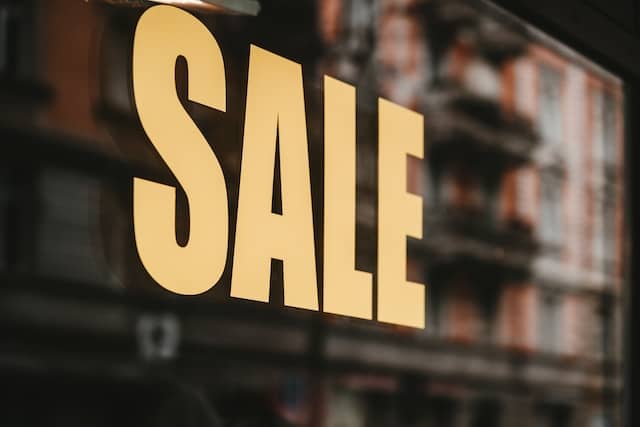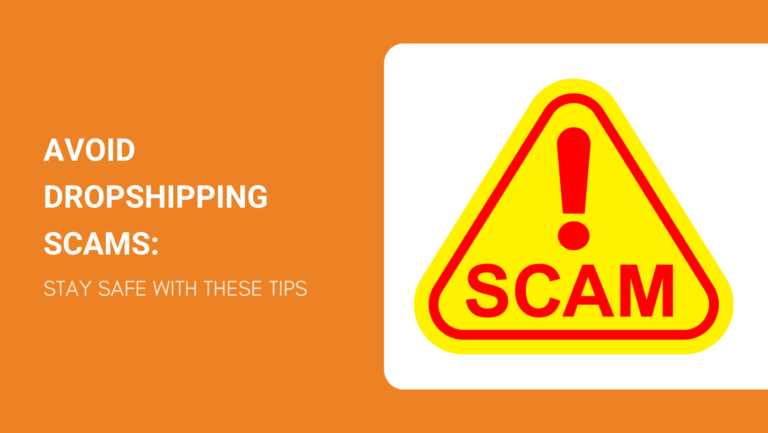Dropshipping might seem like a straightforward path to e-commerce success, but it’s not without its pitfalls.
At its core, dropshipping is a method where you, the retailer, sell products to consumers without holding any inventory; when an order comes in, you pass it to a third party who ships the goods directly to the customer.
Sounds simple, right? Yet, when exploring this seemingly attractive business model, it’s crucial you remain vigilant about the potential for scams.
The prevalence of dropshipping fraud can’t be ignored, as fraudsters have found ways to exploit unwary entrepreneurs.
These deceptive practices range from selling counterfeit products to setting up fake suppliers, and the risks can jeopardize not only your investment but also your brand’s reputation.
Want to avoid becoming a victim? Then continue reading as we uncover some of the most common dropshipping scams and how to sidestep them.
Key Takeaways
- Dropshipping is a legitimate business model with an associated risk of scams.
- To safeguard your venture, be alert to counterfeit goods, fake suppliers, and much more.
- Implement vetting procedures and stay informed to prevent falling prey to dropshipping fraud.
Quick Answer
| 1. Counterfeit Products |
| 2. Deceiving Samples |
| 3. Fake Suppliers and Reviews |
| 4. Disappear After Payment |
| 5. Hidden Fees |
| 6. Sales Rep Scam |
| 7. Get-Rich-Quick Schemes |
| 3. Fake Suppliers and Reviews |
Is Dropshipping a Scam?
You might have heard of dropshipping as a means to start an online business with relatively low initial investment, and you’re right to find its legitimacy questionable.
Rest assured, dropshipping is a valid business model used by many successful online stores due to its low overhead. It’s definitely not a scheme, hoax, or, in itself, illegal or unauthorized.
However, not all dropshipping opportunities are created equal. There are indeed unethical schemes masked as dropshipping businesses that mislead aspiring entrepreneurs.
For instance, some phony advertisements promise unrealistically high profits with minimal effort, which is a common red flag across various scam scenarios. To avoid getting caught in such traps, caution is necessary.
As a rule, be wary of any dropshipping program that requires you to pay large upfront fees, offers rates that seem too good to be true, or doesn’t provide clear information about their supply chain and product quality.
Furthermore, the statistics indicate a booming dropshipping market, with the industry expected to grow significantly in size. Here’s a table of the projected growth:
| Year | Market Size (in billion USD) |
| 2020 | 128.6 |
| 2026 | 476.1 |
Note that these figures are projected and as with any business venture, there’s no guaranteed success. But with the right research, ethical practices, and dedication, you can certainly build a trustworthy dropshipping business.
It’s all about partnering with reliable suppliers and staying transparent with your customers to foster a reputable brand.
In summary, while dropshipping itself is not a scam, you should always remain vigilant for deceptive practices within the space.
Conduct due diligence, and remember, if something seems misleading or too good to be true, it warrants a deeper investigation.
What Is Dropshipping and How Does It Work?
Dropshipping is a streamlined form of retail where you, the retailer, do not keep products in stock.
Instead, when you sell a product, you purchase the item from a third party and have it shipped directly to the customer. As a result, you never see or handle the product.
The Dropshipping Process
Here’s a basic outline of how dropshipping works:
- List Products: You list products for sale on your website.
- Customer Orders: A customer places an order on your site, paying the retail price you’ve set.
- Supplier Fulfillment: You forward the order to your supplier, paying the wholesale price.
- Product Shipped: The supplier ships the product directly to the customer.
The difference between the retail and wholesale prices is your profit.
Why Choose Dropshipping?
- Low Startup Costs: You don’t need to invest in inventory.
- Flexibility: Operate from anywhere with internet access.
- Wide Selection: Offer a vast array without stock limitations.
Remember that successful dropshipping relies on a trustworthy relationship with your suppliers and understanding your customers’ needs.
Keep informed about potential dropshipping scams and continually vet your suppliers to ensure that your dropshipping business remains a reputable and ethical enterprise.
Why Do Many People Believe Dropshipping Is a Scam?
The nature of dropshipping, where the seller doesn’t keep products in stock but directly ships from a third party, can sometimes create a breeding ground for dodgy and shady practices.
1. Dubious Quality Control
Because you never handle the inventory, you must beware that quality control is out of your hands.
Customers might receive products that differ significantly from the online description, leading to dissatisfaction and the perception of being deceived.
2. Lack of Transparency
There are dropshipping operations that lack transparency regarding where products come from or how long shipping will take, which can make you wary.
You expect clear communication, and when that’s missing, red flags go up.

3. Overpromised and Underdelivered
An unfortunate reality is that some sellers make grand promises about the potential for success with dropshipping. When these promises aren’t met, it can feel like a rip-off.
4. High Competition
The dropshipping market is saturated, and many of you might find it difficult to enter the niche or to compete on price. This saturation can make dropshipping seem like a misleading opportunity to newcomers.
5. Real-World Example
Imagine ordering a gadget that looks high-end online, but when it arrives, it’s a cheap knock-off. Such experiences can quickly make anyone question the legitimacy of dropshipping businesses.
8 Common Dropshipping Scams and How to Avoid Them
1. Counterfeit Products
In dropshipping, the prevalence of counterfeit goods can severely damage your brand’s reputation and lead to legal issues. You must become adept at recognizing and avoiding fake products.
How to Detect
Detecting counterfeit products, although tricky, begins with a vigilant eye for detail. Look for telltale signs such as inconsistencies in branding, poor-quality materials, or anomalies in packaging.
Prices that seem too good to be true can also indicate counterfeit goods. Online marketplaces often provide feedback and reviews that can help you identify if previous customers received authentic products.
How to Avoid
To effectively steer clear of counterfeit items:
- Vet Suppliers: Conduct thorough research on your suppliers. Partner with those who have a credible history and positive reviews.
- Purchase Samples: Before large orders, buy samples to personally verify the authenticity and quality.
- Use Secure Payment Methods: This ensures transactions are protected and you have recourse in case fraud is detected.
- Stay Informed: Regularly update yourself on how to reduce your chances of buying counterfeit products and the latest tactics counterfeiters use.
2. Deceiving Samples

When you’re starting with dropshipping, you may encounter suppliers who provide high-quality samples, but then send inferior or even counterfeit products to your customers.
These “deceiving samples” scams can damage your brand’s reputation and customer trust.
How to Detect
- Check for Consistency: If you’ve received a sample that seems too good to be true, it’s crucial to test the supplier’s consistency. Order a few more samples at different times to ensure quality remains the same.
- Research the Supplier: Look for reviews of the supplier online. If others have reported a decline in product quality, this is a red flag.
- Inspect Product Details: Examine the sample carefully. Authentic products have quality materials and finishes, while counterfeit items often have noticeable flaws and cheaper materials.
How to Avoid
- Document Everything: Take detailed photos and notes of the sample you receive. This documentation can be crucial if the quality of the products shipped to customers doesn’t match what you were promised.
- Use Reliable Suppliers: Establish relationships with reputable suppliers known for their quality and reliability. This can often be identified by their historical reviews and time in the industry.
- Sample Multiple Products: Don’t stop at one. Order samples of various products to confirm consistent quality across the board.
- Set Clear Expectations: Communicate clearly with your supplier about the quality standards you expect for your customers. Make sure these expectations are part of any contractual agreement.
3. Fake Suppliers and Reviews
In the dropshipping business, encountering fake, untrustworthy suppliers and unsubstantiated positive reviews is a common hurdle.
Sharpening your ability to spot counterfeit items and illegitimate entities is critical for your business’s integrity and success.

How to Detect
Fake Suppliers:
- Inconsistent Contact Information: Verify the provided phone numbers, email addresses, and physical locations. Cross-reference these details with official registries.
- Poor Quality Websites: Often, fake suppliers have low-quality websites with broken links, typos, and outdated information.
- No Business History: A genuine supplier likely has a track record you can investigate. Look for trade show participations, industry affiliations, and customer testimonials.
- Pressure Tactics: Be wary of suppliers who apply high-pressure sales tactics or push for immediate decisions.
Fake Reviews:
- Overly Positive Language: Watch for excessively glowing reviews that lack specific details.
- Similar Wording Across Reviews: Copy-pasted or very similar reviews can be a sign of fabrication.
- Timing of Reviews: A large number of reviews posted within a short timeframe might indicate a scam.
How to Avoid
Fake Suppliers:
- Conduct Due Diligence: Research each supplier thoroughly. Check for business licenses and read through real customer testimonials.
- Seek Verifiable References: Ask for references and follow up with them to verify their experiences.
- Sample Products: Request samples to assess product quality — counterfeit products often reveal themselves in poor craftsmanship.
Fake Reviews:
- Use Trusted Platforms: Stick to reputable platforms or marketplaces that have mechanisms to vet and verify reviews.
- Fact-Check Reviewer Profiles: Look for history and consistency in reviewer activity across other products or services.
4. Disappear After Payment

Scammy and dishonest people are exploitative and may take your payment and vanish without sending any products. It’s crucial you spot these scams early.
How to Detect
- Unexpected Communication Breakdown: After payment, if the supplier stops responding to your messages, it’s a red flag.
- Lack of Order Confirmation: You should always receive a confirmation after payment. Silence suggests a scam.
How to Avoid
- Perform Due Diligence: Research suppliers thoroughly before making any payments.
- Use Secure Payment Methods: Opt for payment channels that offer buyer protection in case of fraud.
Hidden fees in dropshipping can quickly erode your profits and damage your business’s reputation. It’s important to be aware of fees that aren’t immediately apparent when you enter into an agreement with a supplier.
How to Detect
Detecting hidden fees in dropshipping requires scrutinizing each supplier’s pricing structure carefully. Always examine the fine print of any contracts or agreements.
Be on the lookout for terms like “handling fees,” “service charges,” or “processing fees” that may not be clearly disclosed upfront.
- Review Supplier Agreements: Thoroughly read all supplier contracts and terms of service.
- Ask Direct Questions: Inquire with your supplier about all potential fees beyond the cost of the items.
- Monitor Statements: Regularly check payment statements for any unexplained or unexpected charges.
How to Avoid
To avoid hidden fees, it’s crucial to do due diligence when selecting dropshipping partners. Here’s how to safeguard yourself against unnecessary expenses:
- Negotiate Terms: Before agreeing to a partnership, discuss all fees and push back on any that seem unreasonable.
- Choose Reputable Suppliers: Partner with suppliers with transparent pricing and a proven track record.
- Keep Communication Open: Maintain an open line of communication regarding any changes in fees with regular check-ins.
6. Sales Rep Scam

Beware of sales representatives who may appear trustworthy but intend to defraud you by offering counterfeit products or irresistible prices. These scams often involve requests for direct payment to personal accounts, bypassing legitimate business channels.
How to Detect
- Incredible Deals: If an offer from a sales rep seems too good to be true, it might be a scam. Authentic brands rarely offer high-end products at extremely low prices.
- Unverified Identity: Scrutinize the sales rep’s credentials. Fraudulent and unscrupulous reps often lack proper identification or association with the authentic brand.
How to Avoid
- Verify Legitimacy: Always check if the sales rep is officially connected to the brand they are representing. This can include reaching out to the company directly.
- Secure Payment Methods: Use trusted payment methods and platforms that offer buyer protection. Avoid transferring money to personal accounts.
7. Get-Rich-Quick Schemes
When exploring dropshipping, beware of get-rich-quick schemes that often signal scams. These scams lure you with promises of easy money but risk your investment, reputation, and customer trust.
How to Detect
Detecting get-rich-quick schemes in dropshipping requires vigilance. Look for:
- Unsubstantiated Claims: If you encounter promises of excessive profits with little effort, be cautious.
- Pressure Tactics: Scammers often create a sense of urgency, pushing you to act quickly.
How to Avoid
Avoiding get-rich-quick schemes in your dropshipping business involves:
- Research: Always conduct comprehensive research on any potential dropshipping partner.
- Transparency: Seek transparency in all dealings. Legitimate suppliers have nothing to hide.
- Due Diligence: Perform due diligence in verifying supplier credibility and customer satisfaction.
8. Data Theft
In dropshipping, data theft can occur when your personal or customer information is stolen for malicious and unsafe use. It’s imperative to safeguard this data to ensure the safety and trustworthiness of your business.

How to Detect
- Unusual Account Activity: Regularly monitor your accounts for any unanticipated changes or transactions. Such anomalies may indicate that your data has been compromised.
- Alerts from Customers: Pay attention if customers report unauthorized charges or if they receive unsolicited emails from your business.
How to Avoid
- Secure Your Site: Make sure your website has SSL encryption and robust security plugins to defend against the dangers of data breaches.
- Educate Yourself and Staff: Keep yourself and your employees informed about the latest cybersecurity measures and ensure that everyone follows best practices.
- Use Reliable Providers: Partner with credible dropshipping suppliers who have a strong track record of protecting data.
- Regular Updates: Consistently update your systems and software to seal any security loopholes.
Remember, counterfeit products can not only harm your brand’s reputation but can also be a gateway for scammers to introduce malware, exposing you and your customers to data theft. Always vet products and suppliers thoroughly.
Tips to Avoid Dropshipping Scams
When entering the world of dropshipping, it’s essential to approach with a cautionary stance. While most suppliers are legitimate, some may try to deceive you. Here’s a helpful list of tips and tricks to keep you safe:
1. Verify Company License.
If you’re working with a supplier outside an eCommerce marketplace then always ask for the company registration number and business license number.
Most scammers do not give basic registration information online to avoid being tracked by law enforcement officials.
They may, for example, present a fictitious firm address, phone number, and fax number, or entice buyers to contact them solely by mobile phone.
Using the area code, you may perform a simple check on the location of the phone number.
2. Pay Attention to Unrealistic Offers.

Always remember, if it looks too good to be true, then it probably is. Price shouldn’t be the only factor that you should consider while dropshipping.
Many scammers would set unrealistic prices for their products to lure customers.
As soon as you trust them, they will either run away with your money or send you inferior quality products. Pay a higher price if you have to as long as you’re getting top-quality products because that will set you apart from your competitors.
3. Search Online Databases.
If you’re working with a Chinese company, then try searching for them on authorization apps like QiChaCha. It’s a platform certified by the Chinese government.
Try typing in the name of your supplier’s company to see if it comes up. You’ll be able to find out if they were sentenced or if they failed to pay restitution.
Also, additional information about the company, like the registered address and registered organization, helps you get a grip of the company you are working with.
You can use the same method if you’re working with suppliers from other places as well. However, you’ll have to search for a website that has a database of registered companies from that country.
4. Watch Out for Fake Reviews.
Checking the reviews of a supplier is the best way to verify their authenticity – but only when the reviews are legit. Nowadays, many suppliers have started getting fake reviews that can be difficult to distinguish from the real ones.
What you can do is try looking for negative reviews. Suppliers often get a series of positive fake reviews right after a customer writes something negative.
Although it’s true that you can’t satisfy every customer, if you notice a positive review after every few negative reviews then something is definitely fishy.
Try reading the complaints of the customers, if most of them have the same issues with the product, then the supplier is probably manipulating the reviews.

5. Visit Suppliers Factory.
We know, it’s impractical to visit the suppliers’ factories because a trip across the world is a huge investment of time and money.
What you can do, however, is ask them to provide videos/pictures of production, inventory, environment, and more.
Scheduling an online video meeting is an even better approach and can reduce the chances of fraud.
Otherwise, you can also get the assistance of a professional sourcing agent who will physically verify the quality of the products.
What to Do If One Falls Victim to Dropshipping Scams?
If you find yourself the victim of a dropshipping scam, it’s essential to act quickly. Here’s what you can do to address the situation and seek remedy:
- Gather Evidence. Collect all correspondence, transaction records, and other proof of your dealings with the supplier.
- Contact Your Payment Provider. Report the fraud to your credit card company or payment gateway (like PayPal) to dispute the charges.
- Report the Scam.
- Local Authorities: File a police report with details about the fraud. This is crucial for an official investigation.
- Federal Trade Commission (FTC): Report the fraud at FTC Complaint Assistant.
- Internet Crime Complaint Center (IC3): Submit a complaint with the IC3, which is a partnership between the FBI and the National White Collar Crime Center.
- Take Legal Actions.
- Consult an Attorney: To understand your legal options, you should talk to a lawyer specializing in consumer fraud.
- Small Claims Court: If your loss is within the monetary limits, this court can be a quicker, less expensive option for resolution.
Seeking help is imperative. Local consumer protection offices, legal aid, or the Better Business Bureau can also offer assistance and advice.
Stay vigilant and warn your network about the fraudulent activity to prevent further incidents. Remember, your actions can help others avoid similar pitfalls.
How to Build a Safe Dropshipping Business?
Building a safe dropshipping business requires careful planning and ongoing vigilance to avoid scams. Here are some best practices to help you establish a trustworthy and reliable dropshipping operation:
- Vet Your Suppliers: Thoroughly research suppliers to ensure they’re ethical and legitimate. Look for reviews, testimonials, and ensure they have a history of reliable service.
- Secure and Private: Keep your website and customer data secure. Implement SSL certificates and choose platforms recognized for their safety standards.
- Clear Policies: Outline clear return policies and terms of service on your site. Transparency helps build trust with your customers.
- Monitor Your Business: Regularly review orders and customer feedback to quickly handle potential issues.
- Educate Yourself: Stay informed on common dropshipping scams and the latest in fraud prevention to protect your business.
- Quality Control: Order samples from your suppliers to personally check the reliability and quality of the products being shipped in your name.
- Transparent Marketing: Be honest in your marketing efforts. Don’t overpromise on product capabilities or delivery timelines.
- Customer Support: Offer excellent customer support. Quick and helpful responses make for a more trustworthy business.

FAQs on Dropshipping Scams
In navigating dropshipping as a business model, it is crucial to differentiate trustworthy operations from potential scams. The following common questions can guide you in making informed decisions.
Is Dropshipping a Legitimate Business?
Yes, dropshipping is a legitimate method of order fulfillment where you sell products without carrying inventory.
When a customer places an order, the product is shipped directly from the supplier to the customer.
However, as with any business, due diligence is important to avoid scams.
Are Dropshipping Sites Legit?
Many dropshipping sites are legitimate platforms that can help you set up and grow your e-commerce business.
Nevertheless, some may disguise as genuine but have intentions of defrauding unsuspecting entrepreneurs.
It’s essential to conduct thorough research and read reviews from other users.
What Are Some Warning Signs That a Dropshipping Operation May Not Be Legitimate?
Beware of suppliers requesting an ongoing fee to do business with them or providing vague contact information.
Also, a lack of transparency about shipping times, costs, and refund policies might be a red flag that the operation is unreliable and not legitimate.
How Can I Verify the Legitimacy of a Dropshipping Supplier before Partnering with Them?
Start by requesting for references and checking for business licenses. Look for reviews from other businesses they’ve worked with.
Additionally, consider placing a sample order to personally experience their shipping speed and product quality.
Always use secure payment methods and avoid any supplier that only requests payment through untraceable methods.
Safeguarding Your Dropshipping Journey: Final Thoughts
Embarking on a dropshipping journey can be exciting, but it’s essential to navigate this path with caution to avoid the pitfalls of scams.
Before trusting a supplier, go through their reviews, and order a sample product.
Most importantly, you need to keep in mind that there are no shortcuts to success.
So if you’re ready to put in the effort, but unable to find a trustworthy supplier, then NicheDropshipping has got your back.
Our team has supported 3000+ entrepreneurs to start and grow their dropshipping businesses.
Not only do we offer product sourcing, but also private labeling services to help you build a brand.
If you’re looking to streamline your dropshipping process and find reliable products, don’t hesitate to request a personalized sourcing quote from us today. With the right support, you can build a trustworthy and profitable dropshipping business.


Hi interested to know more about how you can help me grow my business.
Looking forward to being in touch,
Regards
Angela
Hi Angela, thank you for your interest! You can try our service by sending us a sourcing request. Here’s the link: https://nichedropshipping.com/sourcing-request/
Or send us a message through this email: [email protected]
I was scammed over $345,000 by someone I met online on a fake investment project. I started searching for help legally to recover my money and I came across a lot of Testimonies about Ultimate Trackers george Recovery Expects. I contacted them providing the necessary information’s and it took the experts about 27hours to locate and help recover my stolen funds. I am so relieved and the best part was, the scammer was located and arrested by local authorities in his region. I hope this help as many out there who are victims and have lost to these fake online investment scammers. I strongly recommend their professional services for assistance with swift and efficient recovery. They can be reached through the link below.
Email: georgevictimhelp @ hotmail . com